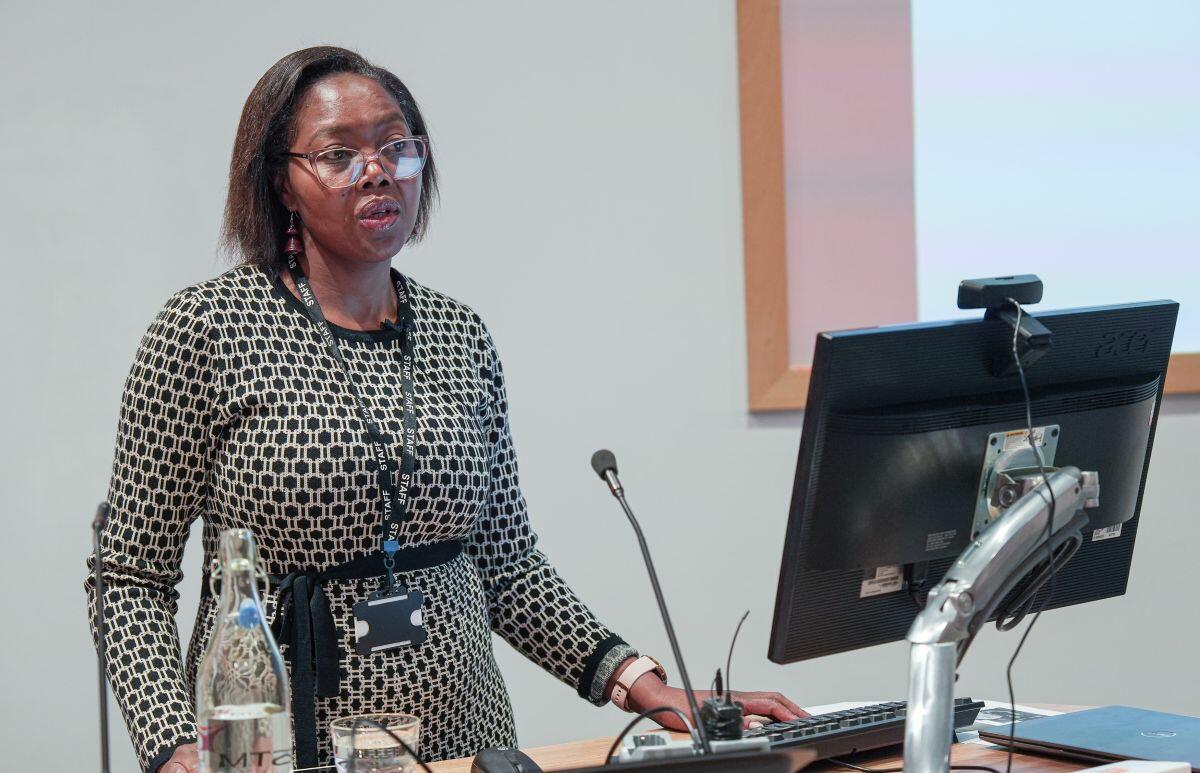
Professor Euphemia Sibanda reflected on her journey in global health implementation research, transforming scientific evidence into effective healthcare interventions for communities that need them most, as part of her inspirational inaugural lecture at Liverpool School of Tropical Medicine.
During her 20-year research career Professor Sibanda, who is Deputy Director of CeSHHAR Zimbabwe, has improved HIV and sexual and reproductive health outcomes in sub-Saharan Africa, contributed to national and international policy change, improved rates of treatment take-up, contributed to the decline in HIV rates in Zimbabwe and influenced self-care guidelines during the COVID-19 pandemic.
The field of HIV and sexual and reproductive health has seen numerous groundbreaking innovations on diagnosis, prevention and treatment. However, many key innovations have not optimally benefitted the people who need them in the real world, particularly in Africa. Professor Sibanda has dedicated her career to finding solutions to some of the associated barriers.
During her address, she led the audience through her research journey, from graduating as a pharmacist to becoming an experienced global health research leader of a portfolio of implementation research studies. She is Deputy Executive Director (Science) at CeSHHAR Zimbabwe, received a prestigious NIHR Global Health Research Professorship in 2023 and was appointed as a Professor of Global Health and Epidemiology at LSTM in 2024, a significant landmark as the institution’s first black female Professor.
Reflecting on her journey in global health research and the importance of mentorship, especially from long-term research collaborator Professor Frances Cowan, she has learned “to conduct research with robustness and integrity, and the values of collaboration and innovation.”
Professor Cowan, Professor of Global Health at LSTM and founder of CeSHHAR Zimbabwe, said: “I’ve worked with Euphemia since she started working as a researcher over 20 years ago. Almost immediately, she was recognised by her colleagues as someone who would excel. She was conscientious, clever, caring, committed and also - she hides this quite well – very competitive!
“Her collaborators and mentors come from Zimbabwe, from various institutions across the UK and Europe, and across the US. They include academics of all stripes, policymakers and funders. Through learning from and harnessing these many collaborations, Euphemia has developed into an internationally renowned global health research leader.”
Research career
Professor Sibanda’s research has been instrumental in informing improvement in uptake of evidence-based HIV and sexual and reproductive health interventions in Zimbabwe, in the African region, and beyond. Her main areas of research include self-care for HIV and sexual and reproductive health, community-led interventions, including pharmacy-based delivery of HIV pre-and post-exposure prophylaxis. She also conducts research on health systems strengthening and is a member of the LSTM Institute for Resilient Health Systems.

During her lecture, she said: “When we think about the implementation of health interventions, there’s usually a gap between what we know and what we do. Research has shown it takes about 17 years for evidence to be adopted into practice, and even if it is, it doesn’t necessarily mean it will be optimally implemented. What we do as implementation researchers is to conduct research that closes the gap between knowledge and action.”
Her innovative, multi-method research that works closely with communities that are the recipients of health interventions is critical.
She said: “A large percentage of my work involves development and evaluation of studies for improving use of health interventions we know to be effective. For this to work well, I need to partner with communities and end users of the interventions so that it works for them. We’re always careful in our work to ensure that we do this in a way that is meaningful engagement and optimises their contribution to intervention development.”
Professor Sibanda’s lecture also reflected on the additional challenges faced by female global health researchers, and earlier this week she met with LSTM’s Dr Becky Jones-Phillips, Chair of the Athena Swan Gender Equity Committee and Director of Enterprise and Innovation, and Lorelei Silvester, Programme Manager for Athena Swan, to discuss gender and global health issues further, as part of LSTM’s gender equity programme and supported by the race equity project team
During this conversation, she said: “Stigma around HIV testing is deeply gendered. Young women face moral judgment for seeking care—especially when it relates to premarital sex. Even when the healthcare provider is a woman, bias and discrimination persist and societal norms can discourage testing.”
Discussing her role at CeSHHAR Zimbabwe, she said: “Our workforce is majority female, and we do make sure there’s balance when recruiting. But it’s not just about having women in roles — it’s about changing how people think about gender equality. If people don’t truly believe in it, even those who benefit from equity programs can struggle to take pride in their success. You hear comments like, ‘She only got the job through affirmative action,’ and that undermines both individuals and institutions.”
She added: “Institutional change needs to come with genuine belief in equality.”
Dr Uzochukwu Egere, Senior Lecturer and Chair of LSTM’s Race Equity Action Committee said: “I congratulate Professor Sibanda on her promotion and her achievement as LSTM’s first Black woman professor. Her success is an inspiration and gives more impetus for our ongoing race equity work.’”
Watch Professor Sibanda’s lecture and find out more about LSTM’s forthcoming inaugural lectures.